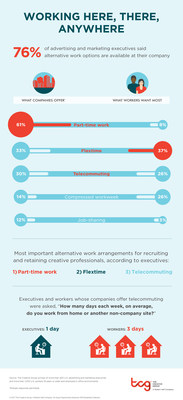Press Releases
Read about our latest research, including results from our ongoing surveys of senior managers and workers, and company announcements.
MENLO PARK, Calif., April 18, 2017 /PRNewswire/ -- Is your office becoming a ghost town? Many work environments may be less crowded, new research from staffing firm The Creative Group suggests. More than three-quarters (76 percent) of advertising and marketing executives surveyed said their company offers some form of alternative work arrangement. The most common is part-time hours, provided by roughly six in 10 employers (61 percent). Flextime and telecommuting are available to another 33 percent and 30 percent of professionals, respectively.

The research shows employees who work remotely do so an average of three days a week. But advertising and marketing executives who are able to telecommute typically spend only one day a week off-site.
Advertising and marketing executives were asked, "Which of the following work arrangements does your agency/firm currently offer?" Their responses*:
|
Part-time work |
61% |
|
Flextime |
33% |
|
Telecommuting |
30% |
|
Compressed workweek |
14% |
|
Job-sharing |
12% |
|
None |
24% |
|
*Multiple responses permitted. |
"Employees value flexibility more than ever, and companies recognize alternative work arrangements can help attract and retain top talent," said Diane Domeyer, executive director of The Creative Group. "This is especially true in creative fields, where jobs can often be done anywhere, as long as the right tools, processes and policies are in place."
Added Domeyer, "While flexibility can help professionals balance work and personal obligations, it's not without challenges. Remote team members must communicate more actively than on-site employees to stay in the know and build solid relationships with colleagues."
Additional findings:
- Executives ranked part-time hours, flextime and telecommuting as the most important alternative work arrangements for recruiting and retaining creative professionals. But what do employees want? When asked which option they find most appealing, the top response was flextime (37 percent), followed by telecommuting and a compressed workweek (tied at 26 percent).
- Advertising executives at large agencies (100+ employees) are more likely to work remotely than those at smaller agencies and their corporate marketing counterparts.
- Younger professionals (age 18-34) are more likely to be employed at companies that offer alternative work arrangements than those of other generations.
View an infographic of the survey findings and visit The Creative Group Blog for:
- Tips on staying connected with colleagues when working remotely
- Strategies on managing a dispersed team
About the Research
The surveys were developed by The Creative Group and conducted by independent research firms. They include responses from more than 400 U.S. advertising and marketing executives, and more than 1,000 U.S. workers 18 years or older and employed in office environments.
About The Creative Group
The Creative Group (TCG) specializes in connecting interactive, design, marketing, advertising and public relations talent with the best companies on a project, contract-to-hire and full-time basis. For more information, including job-hunting services and candidate portfolios, visit roberthalf.com/creativegroup. Follow TCG's blog at roberthalf.com/creativegroup/blog for career and management advice.
SOURCE The Creative Group